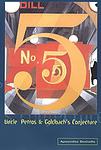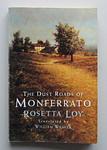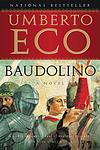The Greatest Italian, Greek "Fiction" Books Since 1970
Click to learn how this list is calculated.
This list represents a comprehensive and trusted collection of the greatest books. Developed through a specialized algorithm, it brings together 288 'best of' book lists to form a definitive guide to the world's most acclaimed books. For those interested in how these books are chosen, additional details can be found on the rankings page.
Genres
Countries
Date Range
Reading Statistics
Click the button below to see how many of these books you've read!
Download
If you're interested in downloading this list as a CSV file for use in a spreadsheet application, you can easily do so by clicking the button below. Please note that to ensure a manageable file size and faster download, the CSV will include details for only the first 500 books.
Download-
1. The Name of the Rose by Umberto Eco
Set in a wealthy Italian monastery in the 14th century, the novel follows a Franciscan friar and his young apprentice as they investigate a series of mysterious deaths within the monastery. As they navigate the labyrinthine library and decipher cryptic manuscripts, they uncover a complex plot involving forbidden books, secret societies, and the Inquisition. The novel is a blend of historical fiction, mystery, and philosophical exploration, delving into themes of truth, knowledge, and the power of the written word.
-
2. If on a Winter's Night a Traveller by Italo Calvino
The novel is a postmodernist narrative that follows the adventures of the reader, who is trying to read a book called "If on a Winter's Night a Traveller." However, the reader keeps encountering obstacles that prevent him from finishing the book, including printer's errors, censorship, and interruptions from other characters. The story is interspersed with the beginnings of ten different novels, each interrupted at a moment of suspense. The book is a meditation on reading, writing, and the nature of narrative itself.
-
3. Invisible Cities by Italo Calvino
In this unique novel, a Venetian traveler describes 55 different cities to the Mongol emperor, each city more fantastical and surreal than the last. The cities are divided into categories such as "Cities and Memory," "Cities and Desire," "Cities and Signs," etc. As the traveler continues to describe these cities, it becomes clear that they are all actually the same city, Venice, seen from different perspectives and points in time. The novel explores themes of memory, perception, and the nature of human experience.
-
4. History by Elsa Morante
"History" is a novel set in Rome during World War II and the post-war period, focusing on the life of a widowed schoolteacher and her young son. The narrative explores the struggles of the impoverished family against the backdrop of war, including the Nazi occupation of Rome, the Allied bombing, and the rise of Fascism. The book also delves into the themes of love, loss, and survival, offering a poignant depiction of the human condition.
-
5. Foucault's Pendulum by Umberto Eco
This novel follows three intellectual friends who work at a small publishing house. As a joke, they start inventing a conspiracy theory about a secret society that has been manipulating world events for centuries. However, as they delve deeper into their own fabrication, they begin to lose sight of what's real and what's not. Their lives take a dangerous turn when actual secret societies believe they hold the key to a universal secret and will stop at nothing to obtain it.
-
6. If Not Now, When? by Primo Levi
This novel follows a band of Jewish partisans behind German lines during World War II. They are a diverse group from different countries and social backgrounds, all brought together by the common goal of sabotaging the Nazi war effort and surviving the Holocaust. The narrative explores their various experiences, the challenges they face, their acts of resistance, and their hopes for a future free from oppression. The title reflects the urgent necessity of their mission and their determination to fight back against their persecutors.
-
7. My Brilliant Friend by Elena Ferrante
This novel tells the story of two friends, Elena and Lila, growing up in a poor neighborhood in Naples, Italy in the 1950s. Their intense, complicated friendship is marked by competition, mutual respect, and deep affection. As they navigate the challenges of adolescence, including family drama, academic struggles, and romantic entanglements, their bond is tested and transformed. The narrative explores themes of female friendship, social class, education, and the struggle for personal autonomy in a patriarchal society.
-
8. The Periodic Table by Primo Levi
"The Periodic Table" is a collection of short stories that use elements of the periodic table as metaphors to explore the author's experiences as a Jewish-Italian chemist before, during, and after World War II. Each chapter is named after a chemical element, reflecting its significant role in the story. The work provides deep insights into the human condition and the power of science, while also serving as a poignant memoir of survival during the Holocaust.
-
9. Silk by Alessandro Baricco
"Silk" is a historical fiction novel that tells the story of a 19th-century French silkworm merchant who travels to Japan for business. During his travels, he becomes enamored with a mysterious woman. His unrequited love for her haunts him for the rest of his life, even as he returns to France and continues his life there. The novel explores themes of love, longing, and the profound impact that brief encounters can have on one's life.
-
10. The Neapolitan Novels by Elena Ferrante
"The Neapolitan Novels" is a four-part series that explores the intricate and lifelong friendship between two women from Naples, Italy. The series spans several decades, beginning in the 1950s, and provides a detailed examination of the women's lives, struggles, and the societal pressures they face. The narrative delves into themes of identity, friendship, love, violence, and socio-political changes in post-war Italy. The series is known for its rich character development and vivid portrayal of female friendship.
-
11. The Daughter by Pavlos Matesis
"The Daughter" is a powerful novel set in Greece during the Second World War. The narrative follows the life of a young girl who is forced to grow up quickly due to the harsh realities of war. Her father, a communist, is executed by the Germans, and the girl is left to navigate the complexities of life, politics, and love in a world that is rapidly changing. The book offers a poignant exploration of the human capacity for resilience, survival, and hope in the face of unimaginable adversity.
-
12. Astradeni by Eugenia Fakinou
"Astradeni" is a coming-of-age novel set in post-World War II Greece. The story follows the life of a young girl named Astradeni, who is forced to grow up quickly due to the harsh realities of war and poverty. Despite the hardships she faces, Astradeni maintains a hopeful and imaginative spirit, often escaping into a world of myths and legends. The novel explores themes of resilience, the power of storytelling, and the enduring strength of the human spirit.
-
13. Uncle Petros and Goldbach's Conjecture by Apostolos Doxiadis
The novel follows the story of a young man who becomes fascinated by his reclusive and eccentric Uncle Petros. As he delves into his uncle's past, he uncovers Petros' obsession with proving Goldbach's Conjecture, a famous unsolved problem in number theory. This obsession led to Petros' alienation from society and ultimately his downfall. The book explores themes of mathematical obsession, family relationships, and the fine line between genius and madness.
-
14. Troubling Love by Elena Ferrante
This novel follows a woman who returns to Naples after her mother's mysterious death, determined to understand the enigmatic life her mother led. As she delves into her mother's past, she uncovers a web of secrets and discovers more about her own identity in the process. The narrative explores themes of mother-daughter relationships, identity, and the power of the past.
-
15. Βιοτεχνία Υαλικών by Menis Koumandareas
This novel delves into the life of a glass craftsman in Athens, exploring the intricate balance between tradition and the encroaching modernity of the 20th century. Through the protagonist's struggles and experiences, the narrative paints a vivid picture of the societal changes in Greece, highlighting the challenges faced by artisans trying to preserve their heritage and livelihoods amidst rapid industrialization and cultural shifts. The story is not just about the craft of glassmaking, but also a poignant commentary on the human condition, resilience, and the inevitable transformation of societies over time.
-
16. Pereira Maintains by Antonio Tabucchi
"Pereira Maintains" is a novel set in the backdrop of 1938 Portugal during the fascist dictatorship of Antonio de Oliveira Salazar. The narrative follows Pereira, a widowed, overweight editor of the culture section of a second-rate Lisbon newspaper, who becomes politically awakened after meeting a young anti-fascist. As he grapples with his conscience, he risks everything to help his new friend and his pregnant girlfriend escape to safety. The story is a compelling exploration of the struggle for moral integrity in a climate of political oppression.
-
17. The Late-night News by Petros Markaris
In "The Late-night News," a seasoned journalist is found murdered in his office. The investigation of the crime falls to a grizzled detective, who uncovers a web of corruption and deceit within the world of Greek media. As he delves deeper into the case, he finds that the journalist was working on a story that could have significant political implications, making the list of suspects long and dangerous. The detective must navigate through this complex world to find the killer, all while dealing with his own personal demons.
-
18. από το στόμα της παλιάς Remington by Giannis Panou
This book is a captivating collection of short stories that delve into the human condition, exploring themes of love, loss, and the complexities of life through the lens of various characters and settings. Each story is meticulously crafted, offering a glimpse into the lives of individuals as they navigate their existence, with the old Remington typewriter serving as a symbolic thread that connects the narratives. The author masterfully weaves tales that are both poignant and thought-provoking, inviting readers to reflect on their own experiences and the universal truths that bind us all.
-
19. Η Αρχαια Σκουρια by Maro Douka
This novel delves into the complex tapestry of Cretan society through the lens of a prominent family's history, spanning from the late 19th century to the mid-20th century. It intricately explores the socio-political upheavals, including the Cretan Revolt, the Balkan Wars, and World War II, and their impact on the island's social fabric and the family's fortunes. Through the personal stories of its members, the narrative weaves a rich portrayal of Cretan identity, tradition, and the struggle for survival and autonomy against the backdrop of historical events. The book is a poignant exploration of memory, history, and the enduring strength of familial bonds amidst the tides of change.
-
20. I'm Not Scared by Niccolò Ammaniti
Set in a small Italian village during the scorching summer of 1978, this novel tells the story of a 9-year-old boy who discovers a horrific crime being hidden by the adults in his community. The boy, while exploring an abandoned farmhouse, stumbles upon a young boy being held captive in a hole. As he tries to help the captive boy, he is forced to face the moral complexities of his world and the terrifying realization that his own father might be involved in this cruel act. The story is a poignant exploration of innocence, friendship and the loss thereof, and the harsh realities of adulthood.
-
21. Διηγήματα by Michail Mitsakis
This collection of short stories delves into the intricacies of human emotions and societal norms through the lens of everyday life in Greece. The author masterfully crafts narratives that explore themes of love, loss, hope, and despair, weaving a rich tapestry of characters and settings that reflect the complexity of the human condition. Through poignant storytelling and a deep understanding of the cultural and historical context, these stories offer a window into the soul of Greek society, highlighting the universal and timeless nature of human experiences.
-
22. The Dust Roads Of Monferrato by Rosetta Loy
Set against the backdrop of rural Italy, the novel weaves a rich tapestry of family saga and historical transformation. It follows the lives of several generations of a family in the Monferrato region, as they navigate the tumultuous changes of the 20th century. Through wars, social upheaval, and personal trials, the characters' stories intertwine with the dusty roads of their homeland, painting a vivid portrait of a community bound by tradition yet facing the inevitable march of progress. The narrative delves into themes of memory, identity, and the enduring impact of the past on the present, all while celebrating the beauty and resilience of the Italian countryside.
-
23. Baudolino by Umberto Eco
Set in the 12th century, the novel follows Baudolino, a self-proclaimed liar and adventurer, as he travels from his home in Italy to the mythical kingdom of Prester John. Along the way, he becomes embroiled in a series of political and religious intrigues, meets a variety of fantastical creatures, and tells a series of increasingly elaborate lies. The narrative is framed as a story Baudolino is telling to a Byzantine historian, adding another layer of unreliability to his already questionable narrative.
-
24. The Seventh Garment by Eugenia Fakinou
"The Seventh Garment" is a compelling narrative that weaves together the lives of several women across different generations, all connected by a mysterious heirloom garment. Set against the backdrop of Greek history and mythology, the novel explores themes of identity, tradition, and the complex bonds of family. As the story unfolds, each woman's personal journey is revealed, reflecting the broader societal changes and challenges they face. The garment serves as a symbol of their shared heritage and the secrets that are passed down through the years, binding them together in a tapestry of resilience and enduring strength.
-
25. Data From The Decade Of The Sixties by Thanassis Valtinos
This book is a compelling narrative that delves into the social and political upheavals of Greece during the 1960s, a period marked by significant turmoil and transformation. Through a meticulous compilation of documents, interviews, and personal stories, the author reconstructs the era's complex landscape, offering readers a detailed examination of the forces that shaped the country's future. The work stands as a testament to the power of collective memory and the importance of preserving historical narratives, providing a nuanced understanding of how the events of the 1960s influenced Greek society and its subsequent generations.
Reading Statistics
Click the button below to see how many of these books you've read!
Download
If you're interested in downloading this list as a CSV file for use in a spreadsheet application, you can easily do so by clicking the button below. Please note that to ensure a manageable file size and faster download, the CSV will include details for only the first 500 books.
Download



















